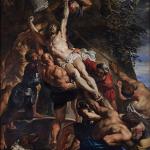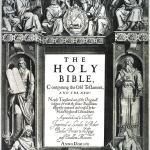Some thoughts on NT Wright’s Rutherford House Lecture, August 2003. I have little disagreement with much of the lecture, and it clarified a number of things for me. Wright’s views on justification, however, continue to puzzle me at a number of points. Here’s an attempt to clarify my (or NTW’s) confusions.
1) Like John Murray, he says that “call” is the biblical term for conversion. And “faith is itself the first fruit of the Spirit’s call.” Great.
2) But then he says that justification “follows on” the call. But, if he’s working with an ordo, that leaves us with the strange situation of “called” and “believing” people whose justification (logically? temporally?) follows. How can faith be the first fruit of the call, and justification be by faith, without justification being a question of entry?
3) I think NTW actually contradicts himself. He says in the section on the lawcourt that God’s declaration, because it is about legal standing, actually MAKES righteous (p 7). But then, in defending his claim that “justify” is NOT entry language, he says that God’s pronouncement is a verdict consequent on the event (p 12) and that it is “a declarative word, declaring that something is the case, rather than a word for making something happen or changing the way something is” (p 12). Pg 13 reiterates the point: justification is “God’s declaration that” sins are forgiven and that one is in the covenant family, a declaration of fact and not a constituting declaration. Do you all see a contradiction here? How does NTW resolve it?
4) Suppose he says that justification and call are logically but not temporally distinct. Then, what has become of his insistence that justification is not entry language?
5) P 14: Here perhaps is the nub, and shows to me (as several of NTW positions do – such as his use of circumcision?Efaith as the progression from OC badges to NC badges) that he is still TOO evangelical/Baptistic. Where is the declaration of justification heard? It is an event rather than simply a statement (I like that), and the event is baptism (I like that too). BUT, is he then saying that BAPTISM is not about entry?? Is he saying that baptism is a statement about what has already happened (ie, baptism/justification is distinguished [but how?] from and subsequent to [but how?] call/becoming a Christian)?
6) This confusion, if it is his and not mine, does raise questions about his views in relation to classic Lutheran-Catholic problematics. That doesn’t decide the truth of his position, but it does give his critics something to work with. I think he’s well within the Reformed camp with this, since people like Murray also place calling logically prior to justification in the ordo. For a Lutheran, however, this just brings back medieval confusions over justification and sanctification. Justification, Lutherans will say, is for NTW a declaration pronounced over a person who has begun (however briefly and imperfectly) to live the new life of the Spirit, over the person who has been called; it is not pronounced over a person who is still in his sins. Perhaps the opposition from Reformed writers is a sign that they are operating in a Lutheran mode here (as in their treatment of law-gospel).















